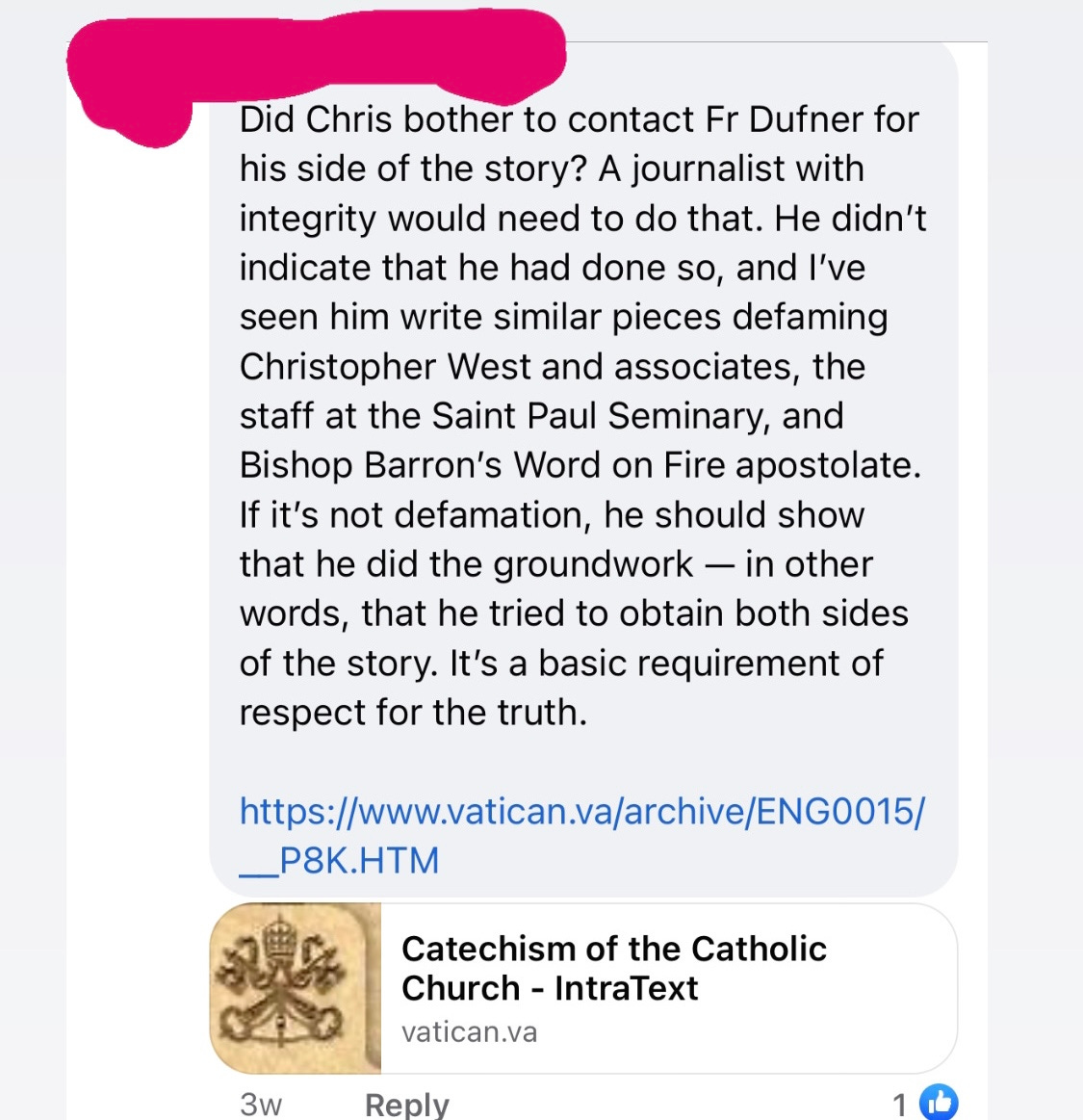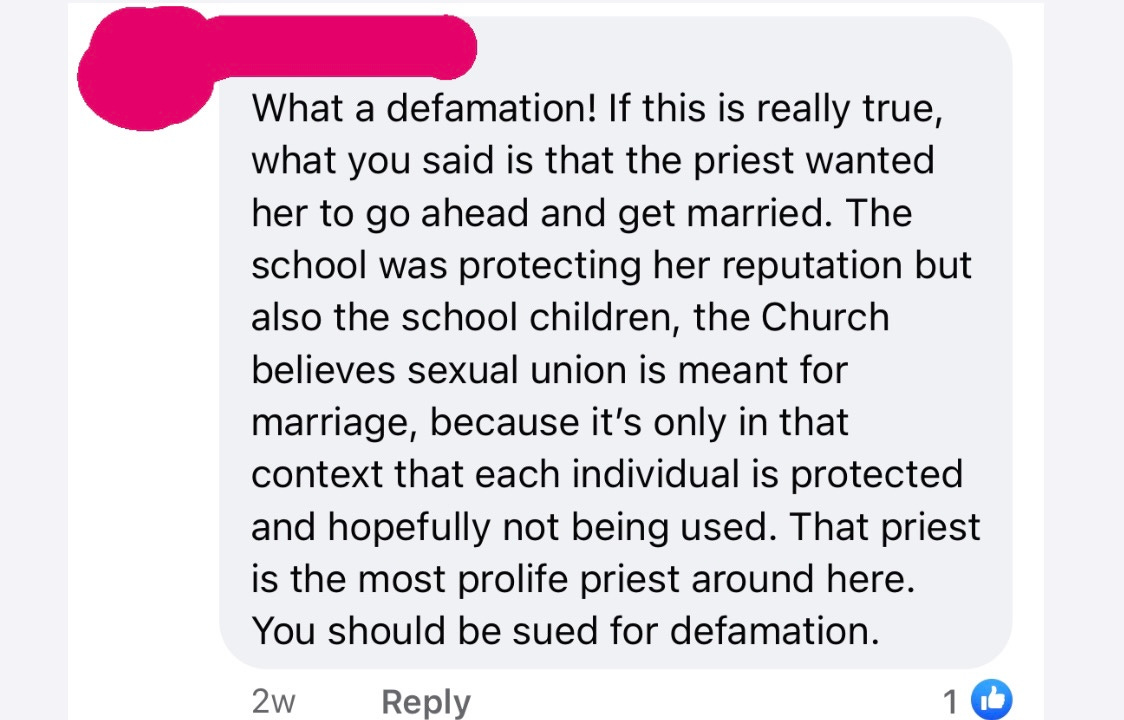Newsletter #23: it's October 4th
In today's newsletter: Mean Girls and St. Francis, the worship of clergy, caring for AIDs patients, and the commodification of gender
Happy Tuesday! Here’s what’s in the newsletter today:
It’s October 4th
Abuse and marginalization in the Church is a team sport
To be Catholic is to be among the worst, and among the best
What I’m reading: Gender complementarity and Marx’s commodities

It’s October 4th
It’s October 4th, the day after October 3rd, also known among millennials as Mean Girls Day. I celebrated with the annual viewing of the film with my friends. What struck me this year was the way in which the film brilliantly captures the creation and formation of desire. I thought by the end: one day I will teach a course on MacIntyre and Girard, and we will watch Mean Girls as part of it.
October 4th is also the Feast Day of St. Francis of Assisi, a man who St. Bonaventure looks to in seeking the heights of erotic love. Several years ago I gave a talk on this, which you can listen to below…
Abuse and marginalization in the Church is a team sport
And the laity don’t sit on the bench. It’s important to note that, though a particular priest might be at the center of clerical abuse and harm, there is often a protective circle around him. That circle is constituted by an over-deference to the priest’s authority, various forms of hero worship and idealization, a constant reference to the priest’s virtues, and a framing of critical stories as sensationalism and anti-Catholic attacks. Though the clergy abuse crisis began with particular instances of abuse by priests, the entire Catholic community played a role in its systemization and perpetuation, including the laity.
This was the case for the abuse perpetuated and overlooked when it came to Fr. Marcial Maciel, the revered founder of the Legionaires of Christ who abused dozens of children. When the allegations arose, and even after he was removed from ministry, Maciel was publicly and passionately defended by many Catholic leaders who emphasized that the man of “radiant holiness” was being attacked by anti-Catholic sensationalists with an agenda. One can see a similar dynamic in response to the harm caused by a local pastor to the Twin Cities, Fr. Thomas Dufner. I recently shared the story of the latter’s role in the removal of an unmarried pregnant woman from her job as a teacher, and how she was pressured into signing a non-disclosure agreement and release of liability for the school, in exchange for the remainder of her salary and health insurance for her and her baby. I posted about this on Facebook:
In November, I was connected with an unmarried pregnant teacher who worked at Epiphany Catholic School in Coon Rapids, Minnesota. She shared that she had been told by the pastor of the school: you can keep your job if you get married next month.
She didn't know what to do. She reached out to the Archdiocese for help, but was told they don't get involved with employment disputes. The school told her she had until the Feast of the Immaculate Conception to tell them her "plan." Her baby was sick. She needed insurance.
She told the priest she needed to focus on her baby and couldn't prepare for the sacrament in that time. He told her that marriages happened in this timeline all the time during WWII, that her boyfriend was "sexually ready" to get married, that he could do the marriage prep.
She communicated she couldn't do this. So the school sprung a contract on her. They said they'd pay her insurance and the remainder of her salary, if she left her job, didn't tell anyone she was pregnant, and agreed to never sue the school or speak of what they did to her. Fortunately, I was connected with her and tried to support her as best I could. We recorded an interview before she signed the contract, and she gave me permission to later share it.
What the school did was a grave scandal. It communicates to women: the only way for you to keep your job if this happens to you is for you to secretly get an abortion. This is a horrible position for a "pro-life" institution.
Since sharing my concerns about these types of scandals, multiple graduates of Catholic schools have shared stories of classmates who secretly had abortions to stay in school. Multiple stories were from schools in my own Archdiocese.
This isn't the only scandal involving the priest, Fr. Thomas Dufner. The Pillar covered the story of a friend of mine who had been sexually abused in that parish as a child, and how Dufner had let her abuser continue working with kids.
I'm so proud of Clare, and also of this teacher. Since Clare has opened up, others have shared how this priest and parish have harmed them. Some have spoken with the Archdiocese. Acts of courage tend to ignite courage in others. We have a lot to learn from these women.
The post received mostly supportive responses. But a number of individuals responded with defenses of Father Dufner. The responses were particularly interesting, because they mirrored defenses of Fr. Maciel by prominent Catholics as his abuse scandal was coming into the public. Below, I’ll share some of the defenses of both Maciel and Dufner in response to their scandals. Their similarities help demonstrate how far we have to go as a Church in being able to address harm by our clergy. Though the dismissal of a pregnant woman is markedly different from the abuse of children, the dynamics which overlook and perpetuate the harm are the same in kind.
Deflection through praise
Of Father Dufner, one member of his parish wrote in response to the teacher’s story:
It’s interesting that this individual does not really engage with the harm suffered here. Instead, they deflect by focusing on what they identify as the many virtues of the priest at issue. Similarly, Father Richard John Neuhaus wrote of Maciel in 1997:
“One cannot help but be greatly impressed by both the discipline and the joy evinced by so many young men who have followed the vision of Father Maciel in surrendering their lives to Christ and His Church. I confidently pray that your apostolate will survive and flourish long after these terrible attacks have been long forgotten.”
Other responses refused to engage with the story of the teacher at all, suggesting that Dufner’s virtues dictate that criticisms not even be considered. For example, two people simply offered praise of Dufner (in ways that also mirror Mary Ann Glendon’s remarks below).
Painting the stories as anti-Catholic sensationalism
Some defenses of Dufner focused on the way the issue was framed, rather than on its substance. They focused on my broader work, rather than this teacher’s particular story. For example, one member of Dufner’s former parish wrote:
Another member of Dufner’s former parish similarly wrote:
These two responses are similar to some additional comments by Neuhaus. After a pair of journalists (Berry and Renner) first broke the story about Maciel, Neuhaus wrote:
“It is not the kind of stuff you would find in any mainstream media, but then Berry and Renner are not practitioners of what is ordinarily meant by responsible journalism. Berry’s business is Catholic scandal and sensationalism. That is what he does. Renner’s tour at the Courant was marked by an animus against things Catholic.”
And they are similar to defenses of Maciel that refused to engage with the actual scandal and instead criticized “anti-Catholic” journalism. For example, Mary Ann Glendon wrote in defense of Maciel:
“The recent revival of long discredited allegations against Father Maciel would come as a surprise were it not for the fact that the U.S. is currently experiencing a resurgence of anti-Catholicism. One would have thought that Father Neuhaus’s meticulous analysis of the evidence in First Things had put the matter to rest once and for all. As one who sat near Father Maciel for several weeks during the Synod for America, I simply cannot reconcile those old stories with the man’s radiant holiness.”
Defamation and lies
Another person wrote in defense of Dufner with accusations of defamation:
Similarly, Deal Hudson wrote in Crisis, calling for another publication to “withdraw its false article and apologize to Father Maciel, the Legionaries of Christ, and faithful Roman Catholics.”
Hero worship
Another member of Dufner’s parish responded by insisting that the teacher’s situation did not matter, given that she had entered into a contract with the school. But the most bizarre part of the comment comes from a sort of cult-like praise of Dufner: “He gets standing ovations for his homilies.”
I myself have never been at a Mass where a homily received a standing ovation. This gives one a very particular sense of the sort of community cultivated by the pastor.
Across these responses, one sees a key ingredient of the clergy abuse crisis: a form of clericalism that paints all criticisms as biased attacks, that dismisses stories of scandal as sensationalism, and that paints over critiques through hero worship. In its capacity to deal with scandal and respond to harm, many parts of the Church are no different from those which perpetuated the abuse crisis of the last several decades.
Good can still come
This all speaks to a need for cultural renewal and transformation. I firmly believe that “the new evangelization” will come to the Church through people like this brave teacher who shared her story of suffering and vulnerability. We need her in order to identify the ways we need to grow, change, and reignite the light of Christ.
The ultimate point of all this is not to shame any of these people, or to “take down” this pastor, his parish, or his school. Good can still come of this. Each of us can take this as an opportunity to reflect on how we ought to respond if the Church leaders we admire are accused of having caused harm. SNAP has helpfully created a list of guidelines for responding to accusations of abuse against a minister, and many of them can be applied beyond simply allegations of abuse to allegations of other harms.
Ultimately, the scandal involving Epiphany Catholic School and Father Dufner is a scandal for the prolife movement. Epiphany Catholic School brands itself as a prolife school. But when it came to choosing life in this instance, the school’s leadership did not choose the life of this teacher’s baby. They chose to pretend as if this beautiful new life didn’t exist. They hid him away. They communicated: you are not worthy of our students seeing you.
This is more than a grave injustice. It is a tragedy. It is a scandal and a source of shame. A school which was truly prolife would have held onto this teacher as an integral part of its community, would have celebrated the life of her child. The school should be holding prayer services for her baby, as he is currently fighting for his life in the hospital. But as an institution, the school continues to pretend as if he does not exist. This will continue to be a scandal when this teacher’s former students grow older and realize why she was removed from the school without an explanation.
But good can still be done. At least three things need to occur. First, the school needs to release the teacher of her confidentiality obligations under its contract with her. (Certainly, the value of the contract will still be realized in its ability to prevent her from suing the school, which would cost the school significantly more than her modest salary and health insurance.) Second, the school and its leadership need to publicly apologize. Third, it needs to implement a new policy for the choice for life, a policy which states that faculty, staff, and students will not face adverse employment or enrollment actions because of an unplanned pregnancy.
To be Catholic is to be among the worst, and among the best
I recently had the privilege of hosting a conversation with Michael O’Loughlin on his recent book Hidden Mercy: AIDS, Catholics, and the Untold Stories of Compassion in the Face of Fear. I’m working on putting the audio together to share with you all. But in the meantime I want to highlight an interesting bit of the conversation.
Near the end of the event, one attendee asked about being able to keep young Catholics in a Church that is often viewed as participating in the dynamics of marginalizing and oppression. In response, I shared that one thing I appreciated about the book is how it captured how the Church is many things all at once: during the AIDS crisis, the Church both was a loud voice stigmatizing AIDS and those who suffered from it, and also was at the forefront of providing aid and care to those who suffering from AIDS.
This continues today. With regards to many instances of marginalization, oppression, and suffering, Catholics are often key leaders in the perpetuation of harm, and also key leaders at the forefront of addressing harm. To be Catholic is to be among the worst. And it is also to be among the best. In the United States today, Catholics (including many Catholic political leaders) are among the loudest voices in spreading xenophobia. But at the same time, Catholic Relief Services and Catholic Charities are among the top organizations in the world providing care to migrants and refugees worldwide. So while many Catholic voices are to be condemned for their xenophobia, if you want to be at the forefront of care and aid to migrants and refugees, you will likely have to work with Catholics and Catholic institutions to some degree.
This is not necessarily an argument to “leave” or “stay in” the Church. But it helps to demonstrate the challenge of saying any one thing about the Church, of naming it simply as “good” or “bad.” It is (like most things) many things all at once. You can listen to my conversation with Mike here.
What I’m reading: Gender complementarity and Marx’s commodities
As I read the first volume of Marx’s Capital, and I wondered whether Marx can give us a clue to explain the contemporary Christian obsession with gender complementarity. Marx explains that, in the world of commodities, a thing seems to only have value in relation to a different type of thing. He says, “I cannot… express the value of linen in linen.” To explain linen’s value, we must use a different kind of commodity, like a coat. To find the value of linen, we can explain that value in terms of how many coats a set amount of linen is “worth.”
This brought to mind how John Paul II treats of gender complementarity in a way that is often markedly different from his American commentators. Could this be, in part, because views of value are conditioned by the different economic regimes we grew up in? Though John Paul II was born into a free market economy, largely agrarian, his early adulthood was spent under an industrial Soviet-style command economy. By contrast, popular commentators on the Theology of the Body such as Christopher West, grew up in late capitalist regimes. A key focus of the latter type of regime is an emphasis on the accumulation of wealth, measured in terms of abstracted relativity. For ordinary persons, this wealth is often understood in terms of what it can be exchanged for, which can never be itself.
I’ve commented before on how many contemporary Christians see the achievement of the self and the discovery of otherness primarily through gendered difference. They read man’s loneliness in Genesis 2 and respond, “Yes, God made a woman because man needs an other, meaning someone different from him by virtue of sexual difference! The solution to man’s loneliness, and his need for an other, is sexual difference!” By contrast, John Paul II finds the achievement of the self in a relation largely characterized largely by sameness. He writes that the loneliness in the passage refers not only to “the solitude of man-male, caused by the absence of the woman,” but to “the solitude of ‘man’ (male and female).” It is “the solitude of ‘man’ as such and not only that of the male.” John Paul II argues that Genesis 2 concentrates on this loneliness as “a fundamental anthropological issue that is in some way prior to the issue raised by the fact that man is male and female.” And even Adam’s response to the creation of Eve focuses on her similarity to him.
But I wonder if those who focus on the world of commodity accumulation within our capitalist commodifying regime have a particular difficulty in recognizing the significance of sameness. For example, consider a popular dynamic in Christian young adult communities. For many men, same-sex relations can be seen as largely interchangeable. One man can be as good as another when it comes to friendship and community. The same is true with opposite-sex relations, especially in communities where a high emphasis is placed on traditional gender roles. A number of women could be a fitting potential wife, and could be exchanged for one another with out a real change in value. However, what cannot be exchanged in these dynamics is a man for a woman, or vice versa. Because these are different kinds, they are of different value and perhaps could only be exchanged in some ways once an appropriate exchange rate has been determined.
Many contemporary Christians reduce others to roles, that is, to a sort of commodity. Persons are not encountered as persons, but as potential desire-satisfiers, in the form of husband or wife. They become consumer goods. The implications of this mode of relation are infinite. And it distorts all kinds of goods. Consider education. The “Mrs degree” is just another form of the commodification of education, the devaluation of liberal education. The pursuit of education primarily to attain a spouse is a devaluation of the self, the other, and also education.
Some see this as a function of misogyny, where men expect women to fulfill a certain role for them (that men cannot fill). But what if this is also a function of commodities-focused market economy, where things “alike in kind” have no value since value is measured by relations between different kinds of things? This contrasts sharply with a Christian vision, where each person is an irreducible center of dignity and grace, of value by their individuality and not by a gendered difference. Each person is unique in kind and immeasurable when placed against any other person.
You can follow along with my current reads at Goodreads.
Now accepting submissions!
If you like what I’m doing here and want to join in this developing project, I’d love for you to submit an essay, poems, or a short story for consideration. You can learn more here.
Follow Along
And that’s all I have for you today. If you’re on social media, you’re welcome to also follow me at Twitter and on my Facebook page.











Did Neuhaus ever apologize after the truth about Maciel came out? All these years later the church still does not know how to identify a leader with pathological patterns of behavior.
I am no longer part of the Catholic Church. Deconstructing the priesthood was the last step out for me. I believe the theology around the priesthood serves as a breeding ground for dysfunction and abuse. People in the church are very protective of their priests. They are responsible too.